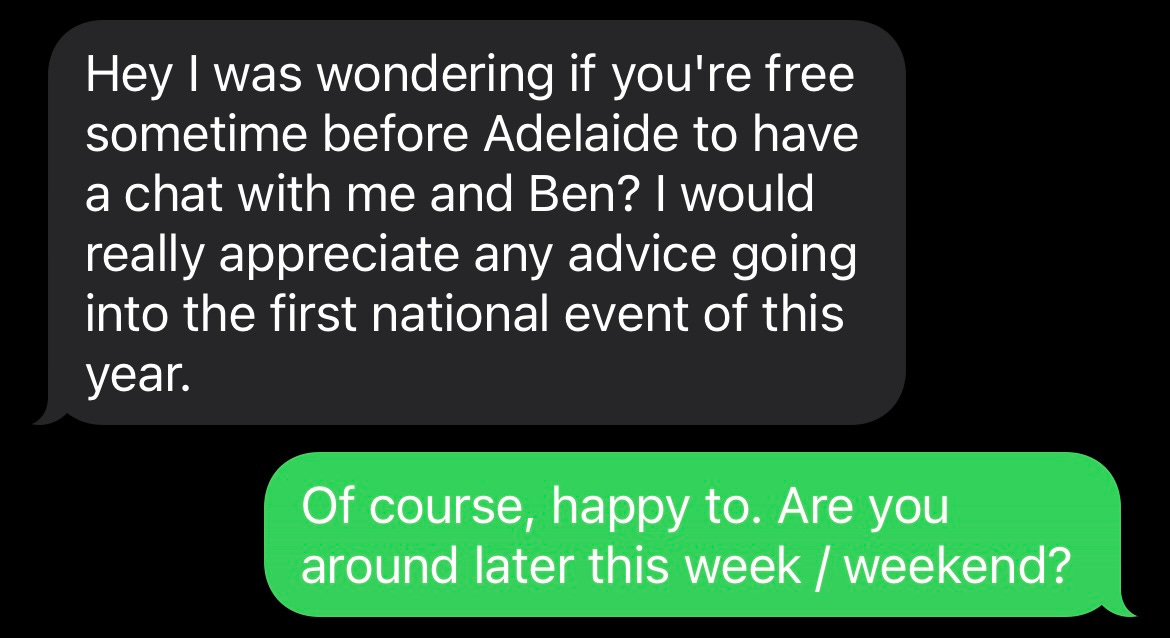Fandom versus critics: Why being a fan is one of the biggest hacks to succeeding
How hyping up your friends, connecting them with opportunities, linking your reputations and being someone's number 1 phone call... actually helps you win.
It was 7am on a Wednesday morning, and we were on the stretch of Australian beach known for its stellar weather, gorgeous white sand, clear waves and throngs of tourists. The Gold Coast.
And it was raining.
Although rain is too mild a word. It was torrential. Bucketing down. The light so dampened by the clouds it barely seemed like day time. The constant booming of thunder echoing. And the wind, swirling at 50km/h, and lashing the rain drops like bullets against against our skin.
My beach volleyball partner and I were warming up for the very first match of the World Tour event. Or trying to warm up.
I’d stripped down to my bikini as every bit of clothing had been drenched immediately. So I was shivering. And I’d put my hat and sunglasses on in an attempt to keep some of the rain from my eyes.
The officials were huddled inside a tent, not willing to even stick their heads out until the last moment. They just rolled a few volleyballs out for us to use for warmup.
Of course volleyballs are made of leather, and simply suck up all the water and multiply in weight. The first one I tried to serve over the net didn’t even make it, yet my shoulder felt like I’d tried to serve a watermelon.
The final straw was the team we’d drawn to play against. We were one of the top seeded teams in the event, and normally would draw an easier team. Instead, we faced two American players fresh off winning multiple events in their country, but who didn’t yet have World Tour points. Everyone was already talking about them being potential Olympic medalists.
We had the toughest first match, in the first (and worst) timeslot of the tournament when no one wants to get out of bed to watch, in conditions so awful the entire stretch of the Gold Coast beach was empty except for us.
I love beach volleyball. But today… not so much. I was miserable.
‘Let’s go Christie and Bec!’ came the cheer.
‘Aussie, Aussie, Aussie!’ followed it.
I looked up to the stands and saw 2 of our friends - both of them athletes who we trained with and competed against. At 7am, in thunderstorm conditions, they had shown up to cheer us on.
Sharing an umbrella that constantly flipped inside out with the wind. Jackets tied tight around their chins trying to keep the rain out. They cheered constantly. Every point. Loud. A little obnoxious. So damn cheerful I couldn’t help but play better.
2 fans. And I’ll always remember.
Be a fan, not a critic
Fans give you someone to fight for. Fans give you an extra boost of energy when you’re struggling. Fans believe in you, even when you doubt yourself.
It’s our natural human instinct to see what is wrong. To see the flaws in another person. But how much better does it feel when someone is a fan of you, not a critic?
"Any fool can criticize, condemn, and complain - and most fools do." ~ Benjamin Franklin
Instead, when was the last time you were a fan for someone else?
"It's more fun to be a fan than a critic. I'm not looking to spend my life tearing things down, when it can be so satisfying to build things up." ~ James Clear
4 ways to be a fan
1. Be extravagant in your praise
We are more likely to use extreme adjectives in the negative. And only mildly positive words in the positive.
When someone asks how you are: ‘I’m exhausted’ versus ‘I’m good’
When describing the date you went on last night: ‘He’s an absolute jerk’ versus ‘He was nice’
When talking about work: ‘That project’s a disaster’ versus ‘That project’s going well’
When talking with your friends about your work colleagues: ‘She’s toxic’ versus ‘She’s good at her job’
When you rate someone, don’t hold back with your praise when you talk about them to others.
2. Link your reputations
If you have a good reputation, linking your reputation is one of the most powerful ways to be a fan.
Publicly praise them from stage, on social media, in groups you are a member of
Be a reference for them
Write them a LinkedIn recommendation (it’s rare people take the time to do this)
Let them name drop you when they are meeting a mutual connection
Share where they are better than you at something
Host events or curate groups and invite them to join
Give them backchannel support (eg. If they are raising money or interviewing for a job - go direct to the person they are asking and speak highly of your friend)
3. Proactively send opportunities
Being a fan means keeping people top of mind for opportunities. You are looking for reasons to bring them up in conversation, or connect them to jobs / people / ideas / opportunities. Keep a mental rolodex of people and what they are working on.
Make introductions for people where it would help them
Recommend them for jobs
Suggest them for panels, events, and opportunities
Connect them with great talent
4. Show up and support
What if someone has great news that they want to celebrate? Or tough news that they need to talk through? Or they need advice? Or need someone to cheer them on? You know you’re doing an incredible job of being a fan when you are one of the first phone calls for someone.
Why being a fan of others is a hack to your own success
Better connections
Who do you want to spend time with? The person that gossips about others, points out where they went wrong, and all of their flaws? Or the person that is high energy, enthusiastic about the people they rate, and radiates positivity.
People assume that if you speak highly of others, you’re probably speaking highly of them.
They’ll want to be friends.
"If you want to lift yourself up, lift up someone else." ~ Booker T. Washington
Status
We might think that speaking highly of others in some way diminishes how people perceive our status or skill.
If I tell you ‘Sarah is a fantastic beach volleyball player’ do you immediately think I’m worse than her?
If I tell you ‘Jane is a world-class investor’ does that mean you think I’m not as skilful?
It’s actually the opposite. To accurately judge who is exceptional in a field you need a certain amount of skill and experience. And to accurately judge who is person of high character, you usually have those qualities yourself. By speaking highly of others, people assume you are qualified to do so.
At scale, you go from speaking highly about one person, to having a large network of people you show fandom towards. Then you start to build status as someone recognised for your ability to curate quality people into your network and friendship circles.
Being a fan increases your status.
"Networking is not about just connecting people. It's about connecting people with people, people with ideas, and people with opportunities." ~ Michele Jennae
Reciprocity
In his book ‘Give and Take’, Adam Grant categorised people as givers, matchers, or takers. Takers will happily receive your fandom and be on their way without giving back. Matchers will feel compelled to return the support in some way to balance the ledger. And givers will freely help you in return.
Showing fandom for a matcher or giver, will almost always come back to you in some way.
This is particularly true when you are a first believer fan, or a non-consensus fan. The support of a single person when everyone else doubts you, or tells you to aim for a more reasonable goal, is never forgotten.
"Flatter me, and I may not believe you. Criticize me, and I may not like you. Ignore me, and I may not forgive you. Encourage me, and I will not forget you." — William Arthur Ward
Performance
Being a fan can become a self-fulfilling loop.
My friends talk up what a good beach volleyball player I am.
They then show up to cheer me on against a beach volleyball team I’m predicted to lose to.
Their support makes me play just a tiny bit better, enough to tip the scales on a tight game.
When I win, their hype about me comes true.
Or in the workplace…
I tell a friend I think she’s a rockstar operator, and connect her with a recruiter for a job.
She goes into the interview with the confidence to voice her opinions and talk about her skills.
I backchannel with the company and tell them how much I rate her. That she’s world class at the skillset they need.
She gets the job, and does exceptionally well, validating your high opinion
Sometimes cheering someone on, putting in a good word, or making a small connection can make all the difference.
Being a fan changes someone’s performance for the better. They perform up to the level you talk about them.
"I have yet to find the man, however exalted his station, who did not do better work and put forth greater effort under a spirit of approval than under a spirit of criticism." ~ Charles Schwab
Be a fan, not a critic
It was 7am on a Wednesday morning, and we were on the stretch of Australian beach known for its stellar weather, gorgeous white sand, clear waves and throngs of tourists. The Gold Coast.
And it was raining. Windy. Miserable. And we’d drawn the toughest team.
I’ll never forget those 2 fans. We remain incredible friends today.
Show up. Cheer your friends on. Connect them to opportunities. Talk them up to others. Rave about them publicly.
Build people up. Be a fan.













Love it Christie! Big fan; in general, of this piece 😉
Thank you
I love this message! The world is already full of criticism and negativity. Why not just be the better person and lift each other up! It also reminds me of the message to show your kids how to live, don’t just tell them, as they will do what you do, not necessarily what you say.
I also like your description of the storm on the Gold Coast. I could feel the weight of that volleyball. 🏐